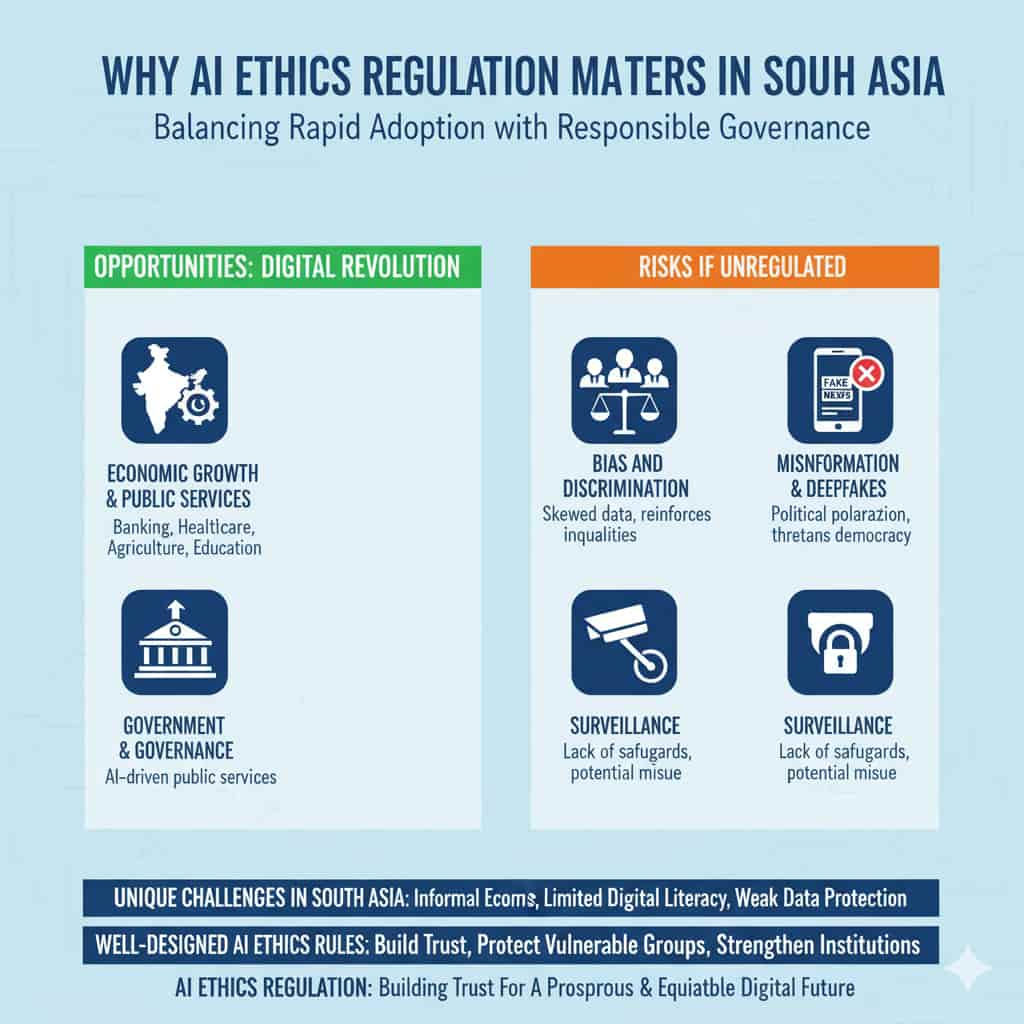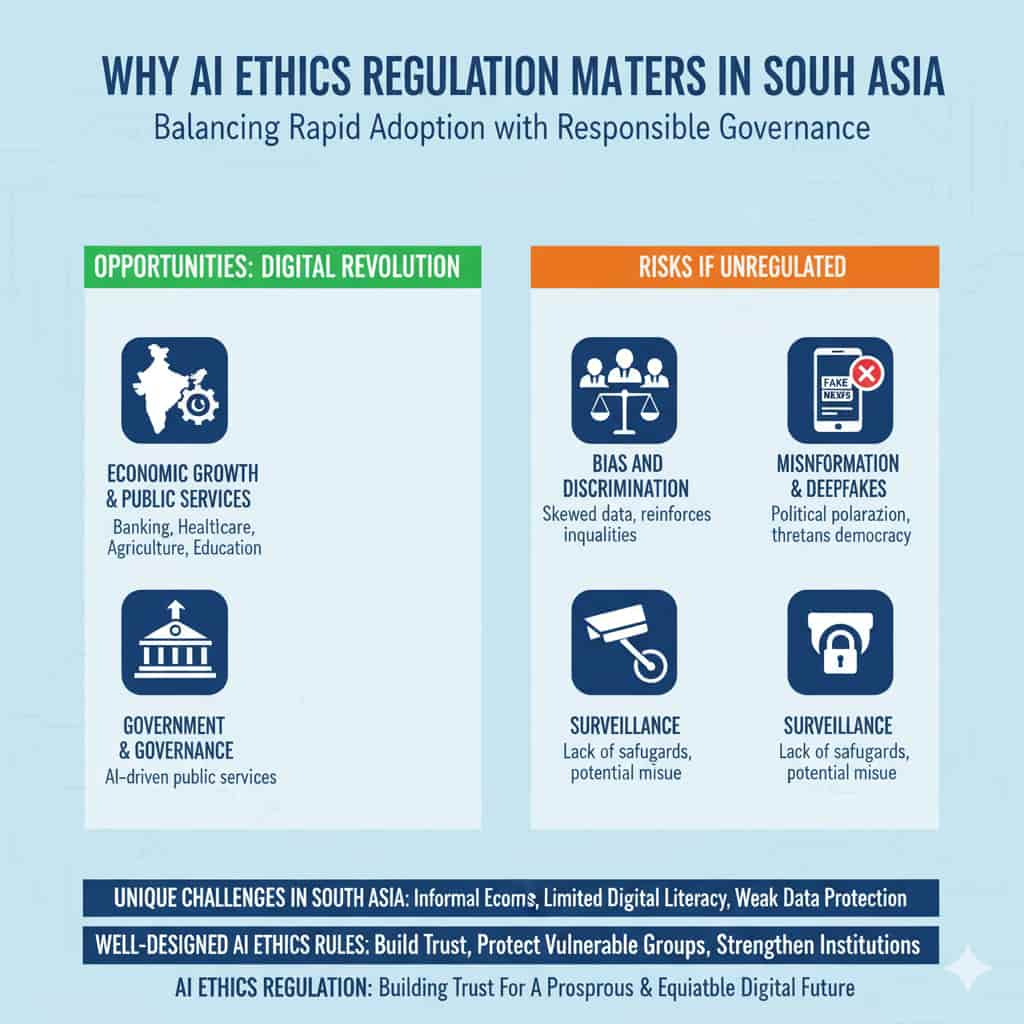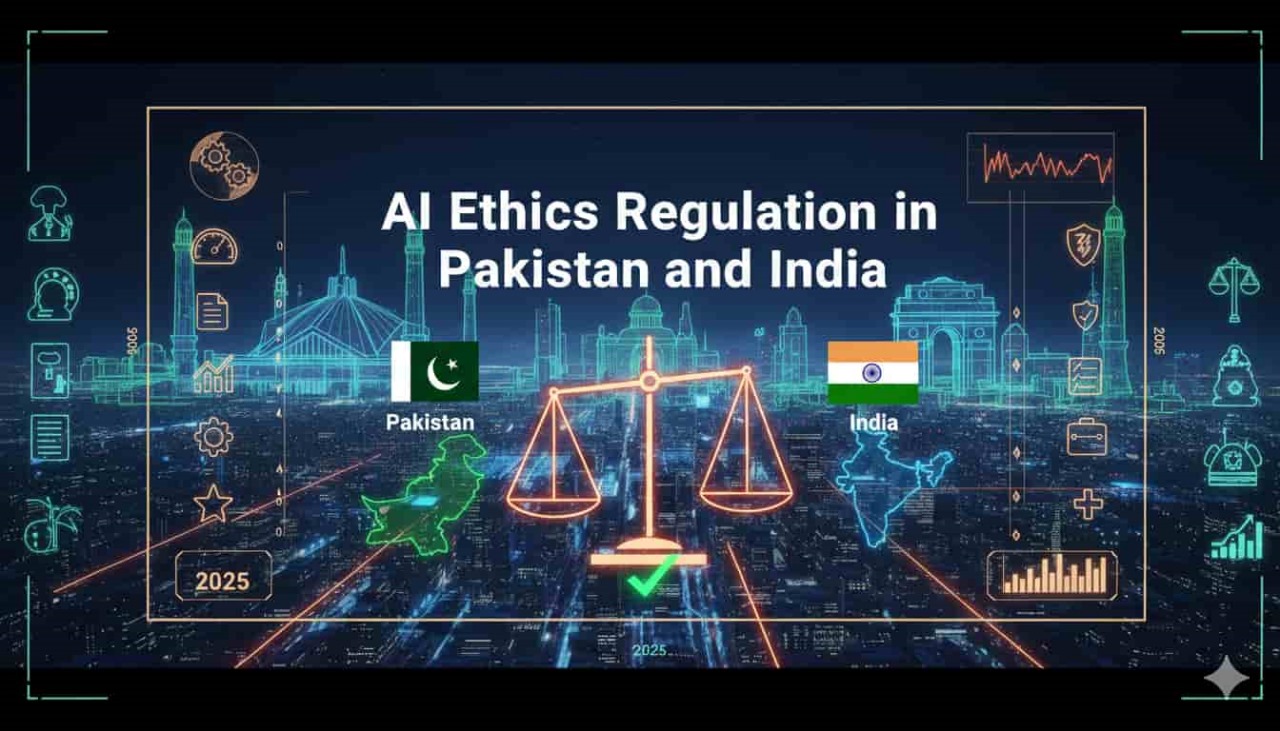1. Introduction
Globally, artificial intelligence (AI) is changing governments, societies, and economies. AI Ethics presents enormous opportunities for India and Pakistan, but it also brings up urgent moral and legal issues. Effective frameworks for regulating AI ethics are now necessary to ensure responsible innovation while preserving the rights and confidence of citizens , they are no longer optional.
2. What Is AI Ethics Regulation?
The development of regulations, guidelines, and policies that control the development and application of artificial intelligence systems is known as AI ethics regulation. It ensures that innovation doesn’t jeopardize people’s rights or the welfare of society by bridging the gap between technology and human values.
Fundamentally, AI ethics aims to provide a straightforward response to the following query: How can we guarantee that machines serve people in a fair, open, and secure manner?
Regulation of AI ethics has a wide reach. It addresses topics like:
- Transparency: People should understand how AI Ethics systems make decisions. “Black-box” algorithms that can’t be explained can create mistrust and harmful outcomes.
- Accountability: Companies and governments using AI must be held responsible for the consequences of their systems. If an AI Ethics causes harm, there must be clarity about who is liable.
- Fairness: AI Ethics should not discriminate based on gender, religion, ethnicity, or socio-economic status. Addressing algorithmic bias is critical to maintaining social justice.
- Privacy: With AI Ethics systems handling enormous amounts of data, protecting individual privacy is non-negotiable. Regulations must ensure that personal data is collected and used ethically.
Regulation of AI ethics serves as a safeguard in governance. Without it, AI could be used for corporate abuse, biased decision making, or unrestricted surveillance. Societies can use it to promote innovation that upholds human rights and dignity. For countries like India and Pakistan, which have sizable populations and developing digital economies, striking this balance is crucial.
3. Why AI Ethics Regulation Matters in South Asia
The digital revolution is taking place in South Asia. AI Ethics is being quickly embraced in India and Pakistan in a variety of industries, including banking, healthcare, education, and agriculture. AI powered governance tools for public services are also being investigated by governments.
But if this quick adoption is not controlled, there are dangers.
- Bias and Discrimination: AI Ethics systems trained on unrepresentative or skewed data can reinforce social inequalities. For example, recruitment algorithms may favor certain demographics, leaving marginalized communities behind.
- Misinformation: Generative AI Ethics tools can spread deep fakes or misleading content, fueling political polarization and threatening democracy.
- Surveillance: AI powered surveillance technologies may be deployed without proper safeguards, leading to privacy violations and potential misuse by authorities.
In South Asia, it’s especially critical to strike a balance between innovation and these risks. India and Pakistan both want to use AI Ethics to improve public services, spur economic growth, and draw in foreign investment. However, in the absence of robust ethical frameworks, AI Ethics has the potential to undermine public confidence, resulting in opposition and backlash.
Large informal economies, low levels of digital literacy, and inadequate data protection infrastructures are some of the particular difficulties South Asia faces. Citizens are therefore more susceptible to unethical AI practices.
The challenge for legislators is to strike a balance between human rights protections and innovation. Regulation must set limits on the use of AI, but it shouldn’t impede technological advancement. Well crafted AI ethics regulations can safeguard vulnerable populations, promote responsible development, and guarantee that AI enhances democratic institutions rather than weakens them.
To put it briefly, establishing trust is the goal of South Asian AI ethics regulations. People must be reassured that technology serves them, not the other way around.

4. Current AI Regulatory Landscape in Pakistan
4.1 Government Policies and Draft Frameworks
Pakistan has taken early steps toward AI governance. The Ministry of Information Technology and Telecommunication (Mo ITT) introduced the National AI Policy draft in 2022, outlining the country’s vision for AI adoption. The policy emphasizes innovation, education, and research, while also mentioning ethical use and governance frameworks.
4.2 Role of Regulatory Bodies and Think Tanks
Institutions like the National Centre for Artificial Intelligence (NCAI) and Pakistan Telecommunication Authority (PTA) are central players in AI research and oversight. Think tanks and universities contribute policy insights, though coordination between stakeholders remains a challenge.
4.3 Challenges in Pakistan
Despite progress, Pakistan faces serious hurdles:
- Enforcement Gaps: Draft policies exist, but implementation is weak. Without legal backing, ethical principles remain aspirational.
- Data Protection Issues: Pakistan lacks a comprehensive data protection law comparable to the EU’s GDPR. This makes enforcing privacy in AI applications difficult.
- Limited Capacity: Regulatory institutions often lack the technical expertise and resources to monitor complex AI systems effectively.
4.4 Examples of AI Use in Pakistan
- Finance: Banks use AI for fraud detection and customer service chatbots. While efficient, these systems raise concerns about transparency and error handling.
- Healthcare: AI-driven diagnostics are being tested in medical research, but issues of data privacy and accuracy loom large.
- Governance: Facial recognition systems for law enforcement and border security have sparked debates over surveillance and misuse.
In summary, Pakistan is at the early stages of AI regulation. The frameworks are promising, but enforcement and capacity-building are crucial next steps.
5. Current AI Regulatory Landscape in India
5.1 Government Initiatives and Ethical AI Guidelines
India has been more proactive in shaping AI policy. The government, through NITI Aayog, launched the National Strategy for Artificial Intelligence (2018), positioning AI as a tool for inclusive growth. Ethical considerations were later integrated into sector-specific policies, focusing on fairness, accountability, and transparency.
5.2 Role of NITI Aayog and Other Institutions
NITI Aayog plays a central role, supported by the Ministry of Electronics and Information Technology. In addition, industry associations and academic groups are involved in shaping ethical AI practices.
5.3 Challenges in India
Despite progress, challenges persist:
- Data Sovereignty: India emphasizes data localization, requiring companies to store citizen data within the country. While aimed at security, this raises compliance challenges for global firms.
- Legal Ambiguity: India has yet to pass a dedicated AI law. Ethical principles exist but lack binding enforcement mechanisms.
- Implementation Gaps: Rural areas and smaller businesses struggle to align with advanced AI policies.
5.4 Case Studies in India
- Education: AI-driven platforms personalize learning, but concerns about student data privacy remain.
- Agriculture: AI tools help farmers predict crop yields and manage resources, yet bias in datasets could disadvantage smallholders.
- E-Governance: AI chatbots and predictive tools streamline citizen services, but transparency about decision-making is often missing.
India’s progress highlights both ambition and complexity. The country is integrating ethics into AI strategies, but strong, enforceable laws are needed to protect citizens effectively.
6. Comparing Pakistan and India’s Approaches
Both Pakistan and India recognize the importance of ethical AI. Their policies emphasize principles like fairness, transparency, and accountability. Yet, their approaches differ in execution.
Similarities:
- Both stress the need for AI in economic growth and public services.
- Ethical guidelines are present in draft policies or strategies.
- Public-private partnerships play a role in shaping the AI ecosystem.
Differences:
- India has a more advanced policy landscape, with NITI Aayog leading structured initiatives. Pakistan’s policies remain in draft or early implementation stages.
- India emphasizes data localization, while Pakistan has not fully addressed cross-border data flows.
- Enforcement in India is patchy but stronger than in Pakistan, where institutional capacity remains limited.
Opportunities for Regional Collaboration:
- Joint research programs on ethical AI tailored to South Asian contexts.
- Shared best practices in data protection and algorithm audits.
- Regional forums for cross-border dialogue on AI governance.
In essence, while India is ahead in policy depth, Pakistan has the opportunity to learn from its neighbor’s successes and pitfalls.
7. Key Ethical Issues in AI Regulation
7.1 Data Privacy and Consent
AI thrives on data. Without robust privacy protections, citizens jeopardy losing control over personal message. Both countries demand stronger consent frameworks to ensure individuals understand how their data is collected and used.
7.2 Algorithmic Bias and Discrimination
Bias in AI is a global issue, but in diverse societies like Pakistan and India, the risks are magnified. Systems trained on biased datasets may reinforce caste, class, or gender inequalities.
7.3 AI in Surveillance and National Security
Governments use AI-powered police work for security, but without safeguards, this can erode civil liberties. Facial recognition, predictive policing, and mass data observance require strict oversight to prevent misuse.
7.4 Intellectual Property and AI-Generated Content
As AI tools make art, text, and music, questions arise: Who owns AI-generated content? Current IP laws in Pakistan and India don’t clearly address this content, leading to legal uncertainty.
7.5 Accountability for AI-Driven Decisions
If an AI system negate a loan or makes a medical error, who is responsible—the developer, the company, or the regulator? Clear liability frameworks are essential to assign accountability and build trust.
These ethical issues highlight the need for comprehensive, enforceable AI regulations that adapt to South Asia’s unique socio-economic realities.
8. How to Build Effective AI Regulations in South Asia
8.1 Adopt International Best Practices
South Asia can get word from global examples like the EU AI Act and OECD principles, accommodate them to local needs. These possibility stress risk-based regulation, transparency, and accountability.
8.2 Encourage Multi-Stakeholder Collaboration
Governments cannot regulate AI in isolation. Collaboration between policymakers, academics, industry, and civil social group is vital. For example, universities can research right AI, while industry groups provide practical insights.
8.3 Develop Clear Compliance and Enforcement Mechanisms
Govern must have dentition. Clear penalization for unethical AI use, compounded with independent watchdog bodies, can ensure accountability.
8.4 Promote Transparency Through Audits and Explain ability Standards
Mandatory algorithmic rule audited account and explain ability necessitate can demystify AI decision-making. National should understand why an AI system made a ad hoc choice, especially in captious areas like healthcare and justice.
Read more: Republic AI Pre-Summit: SC Adv. Dr Pavan Duggal On AI And …
8.5 Support Ethical Innovation and Startups
The startup culture in South Asia is flourishing. Regulators should offer sandboxes—controlled environments for testing AI under regulatory supervision—instead of overburdening innovators. This strikes a balance between ethics and innovation.
It will take institutional strength, political will, and ongoing discussion to effectively regulate AI in South Asia. Pakistan and India can create frameworks that are both morally righteous and useful by fusing local realities with international best practices.
9. Benefits of Strong AI Ethics Regulation
Strong AI rule is not a roadblock; it’s a foundation for progress.
- Protecting Citizens’ Rights and Trust: Regulations safeguard privacy, prevent bias, and build public confidence in AI systems.
- Encouraging Responsible Innovation: With clear guidelines, companies can innovate without fear of crossing ethical lines.
- Enhancing Global Competitiveness: Countries with strong ethical frameworks attract international investors who value stability and accountability.
For Pakistan and India, strong AI ethics ordinance is a chance to position themselves as responsible planetary leaders in AI adoption.

10. Future Outlook for AI Governance in Pakistan and India
India and Pakistan are at different stages of their AI development. As people age, they may experience:
Regulatory Reforms: AI-specific legislation and comprehensive data protection laws.
Regional Collaboration: Coordinated efforts on training, ethical AI research, and policy discussion.
Long-Term Vision: Creating AI ecosystems with human rights, accountability, and fairness as top priorities.
These nations have the potential to not only improve AI but also establish a model of moral leadership for the Global South as a whole if they can strike the correct balance.
Read more: India does not want to regulate AI?
11. Conclusion
AI is a potent force that is changing societies and economies. Its promise carries responsibility for both India and Pakistan. The goal of ethical AI regulation is to steer innovation in ways that promote trust and protect people, not to impede it. These countries can guarantee that AI is a tool for advancement rather than harm by implementing transparent, binding, and inclusive frameworks. Although the road ahead is difficult, South Asia can lead the world in responsible AI governance if it has the vision and collaborates.
Read more: AI Metrics for ROI in Small Business: Best Guide 2025
12. Frequently Asked Questions
12.1 What are the main AI ethics challenges in Pakistan and India?
Key challenges include weak data protection laws, algorithmic bias, and lack of enforcement capacity.
12.2 How do global AI regulations influence South Asian policies?
Frameworks like the EU AI Act inspire local policies, but they need adaptation for regional realities.
12.3 Are there penalties for unethical AI use in these countries?
Currently, penalties are unclear or limited. Dedicated AI laws would need to specify enforcement mechanisms.
12.4 How can startups comply with AI ethics rules?
Startups should focus on transparent data practices, bias testing, and aligning with international standards like OECD AI principles.
12.5 What role do international organizations play in shaping local AI governance?
Bodies like UNESCO and the World Bank provide guidelines, funding, and capacity-building support for ethical AI.
12.6 How does AI regulation affect cross-border data sharing?
India emphasizes data localization, which complicates cross-border sharing. Pakistan has yet to fully address this issue.
12.7 What industries are most impacted by ethical AI policies?
Healthcare, finance, education, and governance are most affected, as they rely heavily on personal data and high-stakes decision-making.
12.8 Can AI regulation slow down innovation in South Asia?
Not necessarily. Properly designed regulation can create trust and attract global investment, boosting innovation rather than limiting it.
12.9 Who is responsible for enforcing AI ethics guidelines?
Enforcement typically falls on national regulatory bodies, though independent watchdogs may also play a role.
12.10 How do citizens benefit from ethical AI regulation?
Citizens gain stronger privacy protections, fairer decision-making, and increased trust in AI-driven services.


1 thought on “AI Ethics Regulation in Pakistan and India Best of 2025”